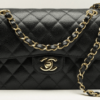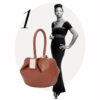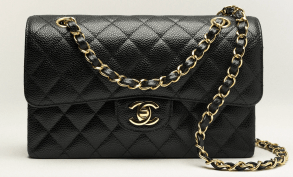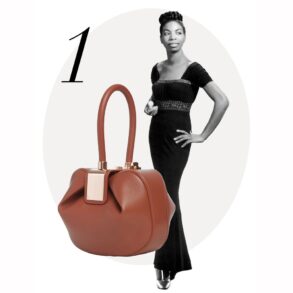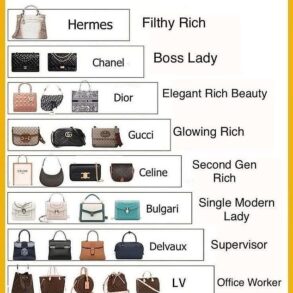Entrepreneur aims for further major expansion of Scottish luxury goods brand.
Its high-end, handcrafted handbags, with their distinctive gold fastening bar, have graced the arms of globally famous names, such as the Princess of Wales and A-list actresses. And Leeanne Hundleby, who along with husband Guy founded Edinburgh-headquartered Strathberry, says this is a great buzz for her and the team.
But the firm also gets a thrill when a member of staff sees anyone with one of their bags out and about. One colleague was in London on the Tube, spotted someone with a Strathberry bag, and told them they loved it, Hundleby laughs. “I don’t know if I’ll ever lose that [excitement myself] – it’s still really special.”
The firm was established in 2013, after the husband and wife team had, while living in the mountain regions of southern Spain with their children, been wowed by the talent of local craftspeople working with leather.
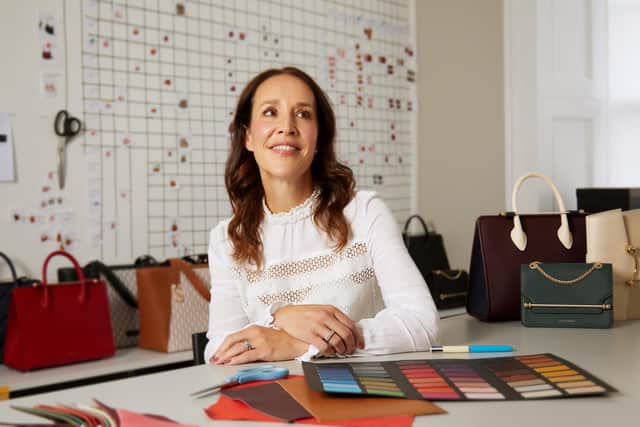

Strathberry to this day has its bags made in Spain, with at least 20 hours devoted to making each product, having been designed in Scotland, and scenery and architecture north of the Border such as galleries – some of its range is inspired by Scottish artist Eduardo Paolozzi, for example – serving as a muse. The brand also takes its name after the word “strath”, meaning wide river valley in Scots, with the berry part a nod to the fruits historically used to dye traditional Scottish fabric and materials.
It has been buoyed by notching up celeb fans such as Meghan Markle, Lady Gaga, Heidi Klum, and Sarah Jessica Parker, who has launched a tie-up with the brand. And Strathberry is positioned in the “accessible luxury” sweet spot, according to Hundleby, with its bags selling for hundreds rather than thousands of pounds, so while it’s not everyday spending, it’s a “considered purchase” that “still makes people feel ‘look, I’ve kind of tapped into luxury’,”.
The luxury handbag industry globally is in fact expected to generate revenue of $68.31 billion (£53.64) this year, and reach US$79.37bn in 2028, according to Statista. It also stated that in the US, the world’s (and Strathberry’s) largest market, “the trend for handbags is shifting towards minimalist designs with clean lines and neutral colours”.
And Hundleby also sees such a shift, saying consumers are moving away from overt branding and flashy logos to “something that’s a bit more simple and sophisticated… we’re [also] making a product that will be around for years to come” rather than sitting in the fast fashion segment.
The Scottish business has itself seen turnover grow at a fast clip from just under £8m in the year to April 2021, this year aiming for £27m, with its sights set on about £40m in 2025. And it now has nearly 100 permanent staff across Edinburgh, London, and Spain.
Helping accelerate the topline has been an £8m funding boost from BGF (formerly known as the Business Growth Fund) announced at the start of 2022. The growth capital investor at the time praised the “authenticity of the brand” and its “loyal following”, adding that the investment would help Strathberry “significantly develop into new product categories, enhance its e-commerce capabilities and grow internationally with its own stores, retail partners and e-commerce channels”.
Hundleby sees the tie-up – the organisations in fact have neighbouring offices on Melville Street in the Scottish capital – as overall helping Strathberry be “more bullish in your decisions and your confidence in your products”. It has also, she explains, helped her firm reinforce its senior leadership team, and provides access to experience of helping other BGF investee firms take their pace of growth up a gear.
Furthermore, it is enabling Strathberry to expand its product range – now also encompassing the likes of cashmere and jewellery – as well as widen its bag offering, with other areas of Scottish craftsmanship also being considered for addition into the mix.
The firm has in recent years opened stores in, say, London’s Burlington Arcade and Covent Garden as well as on Multrees Walk in its native Edinburgh, and is mulling a bigger physical presence both in Scotland (“there’s a lot of good shopping to be had in Glasgow,” Hundleby says) and south of the Border.
It is also looking to scale its overseas presence, already selling to 70-plus countries, with the businesswoman citing Hong Kong and the US as major markets, the latter already providing more than half of the group’s sales with stockists including Saks and Nordstrom.
Hundleby now sees the chance to not only “expand the existing doors with our current portfolio” but also secure new wholesale partners in, say, the Middle East and the Asia-Pacific regions. “We’ve still got a lot of opportunity to grow the brand globally… we’ve never just been a UK based brand, our outlook has always been very global.” More tie-ups with brands are also in the pipeline, after partnerships with Mademoiselle Maurice, the Moomins, Hyo Joo and In The Frow, and having collaborated with Edinburgh College of Art (“a lovely way to kind of connect with emerging talent”).
As for hurdles, she cites the rising cost of materials and labour, and sees customers waiting a little longer before buying a handbag amid a broad tightening of purse strings amid high household bills as the UK flirts with the prospect of a recession. But they are still buying the brand’s offering. “And that’s a wonderful position to be in.”
This post was originally published on this site be sure to check out more of their content.

